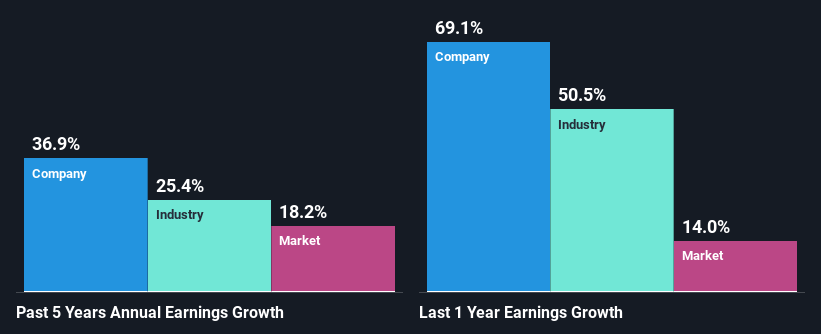S.C. Moara Cibin S.A.'s (BVB:MOIB) Stock Is Going Strong: Have Financials A Role To Play?
S.C. Moara Cibin's (BVB:MOIB) stock is up by a considerable 34% over the past three months. We wonder if and what role the company's financials play in that price change as a company's long-term fundamentals usually dictate market outcomes. Specifically, we decided to study S.C. Moara Cibin's ROE in this article.
Return on equity or ROE is an important factor to be considered by a shareholder because it tells them how effectively their capital is being reinvested. In other words, it is a profitability ratio which measures the rate of return on the capital provided by the company's shareholders.
View our latest analysis for S.C. Moara Cibin
How Is ROE Calculated?
The formula for return on equity is:
Return on Equity = Net Profit (from continuing operations) ÷ Shareholders' Equity
So, based on the above formula, the ROE for S.C. Moara Cibin is:
17% = RON20m ÷ RON117m (Based on the trailing twelve months to June 2024).
The 'return' is the yearly profit. Another way to think of that is that for every RON1 worth of equity, the company was able to earn RON0.17 in profit.
What Is The Relationship Between ROE And Earnings Growth?
Thus far, we have learned that ROE measures how efficiently a company is generating its profits. Based on how much of its profits the company chooses to reinvest or "retain", we are then able to evaluate a company's future ability to generate profits. Assuming everything else remains unchanged, the higher the ROE and profit retention, the higher the growth rate of a company compared to companies that don't necessarily bear these characteristics.
A Side By Side comparison of S.C. Moara Cibin's Earnings Growth And 17% ROE
To begin with, S.C. Moara Cibin seems to have a respectable ROE. Further, the company's ROE compares quite favorably to the industry average of 8.4%. Probably as a result of this, S.C. Moara Cibin was able to see an impressive net income growth of 37% over the last five years. We believe that there might also be other aspects that are positively influencing the company's earnings growth. For example, it is possible that the company's management has made some good strategic decisions, or that the company has a low payout ratio.
Next, on comparing with the industry net income growth, we found that S.C. Moara Cibin's growth is quite high when compared to the industry average growth of 25% in the same period, which is great to see.

Earnings growth is an important metric to consider when valuing a stock. What investors need to determine next is if the expected earnings growth, or the lack of it, is already built into the share price. Doing so will help them establish if the stock's future looks promising or ominous. Is S.C. Moara Cibin fairly valued compared to other companies? These 3 valuation measures might help you decide.
Is S.C. Moara Cibin Making Efficient Use Of Its Profits?
S.C. Moara Cibin has very a high three-year median payout ratio of 372% suggesting that the company's shareholders are getting paid from more than just the company's earnings. Despite this, the company's earnings grew significantly as we saw above. Although, it could be worth keeping an eye on the high payout ratio as that's a huge risk. You can see the 3 risks we have identified for S.C. Moara Cibin by visiting our risks dashboard for free on our platform here.
While S.C. Moara Cibin has been growing its earnings, it only recently started to pay dividends which likely means that the company decided to impress new and existing shareholders with a dividend.
Conclusion
In total, it does look like S.C. Moara Cibin has some positive aspects to its business. Especially the growth in earnings which was backed by an impressive ROE. Still, the high ROE could have been even more beneficial to investors had the company been reinvesting more of its profits. As highlighted earlier, the current reinvestment rate appears to be negligible. Up till now, we've only made a short study of the company's growth data. You can do your own research on S.C. Moara Cibin and see how it has performed in the past by looking at this FREE detailed graph of past earnings, revenue and cash flows.
Have feedback on this article? Concerned about the content? Get in touch with us directly. Alternatively, email editorial-team (at) simplywallst.com.
This article by Simply Wall St is general in nature. We provide commentary based on historical data and analyst forecasts only using an unbiased methodology and our articles are not intended to be financial advice. It does not constitute a recommendation to buy or sell any stock, and does not take account of your objectives, or your financial situation. We aim to bring you long-term focused analysis driven by fundamental data. Note that our analysis may not factor in the latest price-sensitive company announcements or qualitative material. Simply Wall St has no position in any stocks mentioned.
 Index Options
Index Options CME Group
CME Group Nasdaq
Nasdaq Cboe
Cboe TradingView
TradingView Wall Street Journal
Wall Street Journal